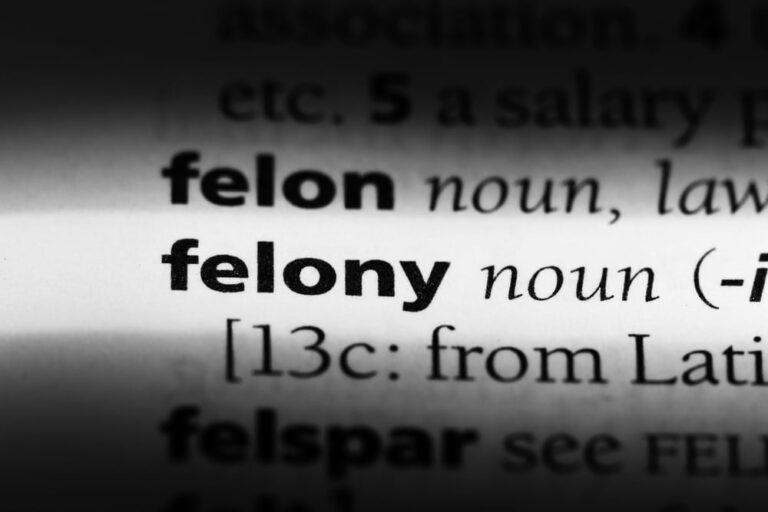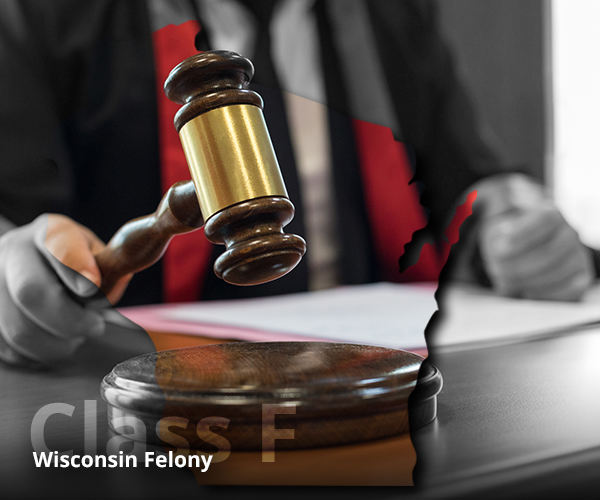When it comes to felony crimes in Wisconsin, there's a lot to unpack, and understanding Felony I is where we start. Imagine you're sitting in a courtroom, and the judge just dropped the term "Felony I." What does it mean? How serious is it? And most importantly, what are the consequences? Felony I in Wisconsin represents the most severe level of felony offenses in the state, and it’s crucial to know the ins and outs if you or someone you care about gets caught up in this legal web.
Now, let's dive into why this matters. Felony crimes are a big deal, and in Wisconsin, they're classified into different levels based on their severity. Felony I sits at the top of the pyramid, and it's no joke. If you're facing charges at this level, you're looking at some serious penalties, including hefty fines and significant jail time. It's not just about the legal implications—it's also about the long-term impact on your life, career, and reputation.
So, buckle up because we're about to break down everything you need to know about Felony I in Wisconsin. From the types of crimes that fall under this category to the potential consequences and defense strategies, this guide has got you covered. Whether you're a curious citizen or someone directly affected by these laws, this information could change the game for you.
Read also:Whats Aocs Net Worth Unpacking The Financials Of Alexandria Ocasiocortez
What Exactly is Felony I in Wisconsin?
Let’s get down to business. Felony I in Wisconsin refers to the most serious category of felony offenses. These crimes are considered the worst of the worst, and the penalties reflect that. If you're charged with a Felony I offense, you're looking at a maximum prison sentence of 60 years. That's right—60 years. We're talking big-time trouble here.
But what kind of crimes fall under this category? Think violent offenses, like first-degree intentional homicide, aggravated battery, or certain drug trafficking charges. These are not your run-of-the-mill misdemeanors. Felony I crimes are the ones that make headlines and shake communities to their core.
Key Takeaway: Felony I crimes in Wisconsin are the most severe, with penalties that can alter your life forever. Knowing the specifics is the first step in understanding the legal landscape.
Breaking Down the Felony Classification System in Wisconsin
Wisconsin has a structured system for classifying felonies, and it's essential to understand how it works. Felonies are divided into categories, ranging from Felony I (the most serious) to Felony G (the least serious). Each category comes with its own set of penalties, and the classification depends on the nature of the crime.
Here’s a quick breakdown:
- Felony I: Maximum 60 years in prison
- Felony II: Maximum 40 years in prison
- Felony III: Maximum 25 years in prison
- Felony IV: Maximum 10 years in prison
- Felony V: Maximum 6 years in prison
- Felony G: Maximum 3.5 years in prison
As you can see, the penalties decrease as you move down the classification scale. But let’s focus on Felony I for now because it’s the big kahuna.
Read also:Vanessa Hudgens Leaks The Truth Behind The Controversy And What You Need To Know
Why Felony I Stands Out
What makes Felony I so unique? It’s the level of seriousness. These crimes often involve violence, premeditation, or large-scale criminal activity. For example, first-degree intentional homicide is a Felony I offense because it involves the deliberate and intentional taking of a life. The stakes are incredibly high, and the justice system reflects that with severe penalties.
It’s also worth noting that Felony I crimes often attract federal attention, especially if they involve drug trafficking, terrorism, or organized crime. This means you could be dealing with both state and federal charges, which complicates matters even further.
The Legal Consequences of a Felony I Conviction
So, what happens if you're convicted of a Felony I offense in Wisconsin? The consequences are brutal, and they go beyond just prison time. Let’s break it down:
- Prison Sentence: Up to 60 years in a state penitentiary
- Fines: Depending on the crime, you could face astronomical fines that could bankrupt you
- Criminal Record: A Felony I conviction stays on your record for life, affecting your ability to find jobs, secure housing, and even vote in some cases
- Social Stigma: Let’s face it—society doesn’t look kindly on convicted felons, and the stigma can follow you everywhere
These consequences are not just theoretical; they’re real and life-altering. If you’re facing a Felony I charge, it’s crucial to understand the gravity of the situation and take action immediately.
Probation and Parole Options
Now, here’s a glimmer of hope. In some cases, you might be eligible for probation or parole, especially if it’s your first offense or if there are mitigating circumstances. Probation allows you to serve your sentence outside of prison under strict supervision, while parole involves early release from prison under similar conditions.
But don’t get your hopes up too high. Felony I offenses are so serious that judges rarely offer leniency. You’ll need a solid defense strategy and a skilled attorney to even consider these options.
Common Felony I Crimes in Wisconsin
Let’s talk specifics. What kinds of crimes fall under the Felony I category in Wisconsin? Here are some examples:
- First-Degree Intentional Homicide
- Aggravated Battery with Intent to Kill
- Large-Scale Drug Trafficking
- Terrorism-Related Offenses
Each of these crimes carries its own set of circumstances and penalties, but they all share one thing in common: they’re incredibly serious and require a robust legal defense.
First-Degree Intentional Homicide
First-degree intentional homicide is the most common Felony I offense in Wisconsin. It involves the deliberate and premeditated killing of another person. The prosecution must prove beyond a reasonable doubt that the defendant acted with intent and premeditation. This is no small feat, but it’s crucial for securing a conviction.
Defending Against Felony I Charges
If you’re facing a Felony I charge, your best bet is to mount a strong defense. Here are some strategies your attorney might use:
- Challenging the Evidence: If the prosecution’s evidence is weak or improperly obtained, it could lead to a dismissal or reduced charges
- Presenting an Alibi: If you can prove you were somewhere else when the crime occurred, it could cast doubt on the prosecution’s case
- Arguing Mitigating Factors: Even in Felony I cases, there may be extenuating circumstances that could reduce your sentence
Remember, every case is unique, and your defense strategy should be tailored to the specifics of your situation.
Hiring the Right Attorney
Choosing the right attorney is critical when you’re facing a Felony I charge. Look for someone with experience handling serious criminal cases in Wisconsin. They should have a track record of success and a deep understanding of the state’s laws and legal system.
Impact on Your Life Beyond the Verdict
A Felony I conviction doesn’t just affect your immediate future; it has long-term implications. Here’s how:
- Employment: Many employers conduct background checks, and a Felony I conviction could disqualify you from certain jobs
- Housing: Landlords often run background checks, and a felony record could make it difficult to secure housing
- Voting Rights: In some states, felons lose their right to vote, and Wisconsin is no exception
These consequences can follow you for years, even after you’ve served your sentence. It’s a harsh reality, but one you need to be prepared for.
Rehabilitation and Reentry
Rehabilitation and reentry programs can help you reintegrate into society after a Felony I conviction. These programs focus on education, job training, and counseling to help former offenders turn their lives around. While they’re not a magic solution, they can make a significant difference in your ability to rebuild your life.
Preventing Felony I Offenses
Of course, the best defense is a good offense. Preventing Felony I offenses starts with education and community support. Programs that address the root causes of crime, such as poverty and lack of education, can go a long way in reducing the incidence of serious felonies.
The Role of Community Organizations
Community organizations play a vital role in crime prevention. They provide resources, support, and opportunities for at-risk individuals, helping them stay on the right path. Whether it’s after-school programs, job training, or counseling services, these organizations are making a difference in Wisconsin communities.
Final Thoughts
Felony I offenses in Wisconsin are serious business, and understanding them is crucial for anyone involved in the legal system. From the classification system to the consequences and defense strategies, there’s a lot to consider. But remember, knowledge is power. The more you know, the better equipped you are to navigate this complex legal landscape.
So, what’s next? If you’re facing a Felony I charge, don’t wait. Seek legal counsel immediately and start building your defense. And if you’re just curious about the law, keep educating yourself. After all, an informed citizenry is the foundation of a just society.
And hey, don’t forget to share this article with your friends and family. The more people understand Felony I in Wisconsin, the better prepared we all are to face the challenges of the legal system. Thanks for reading, and stay informed!
Table of Contents


